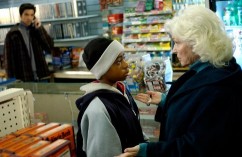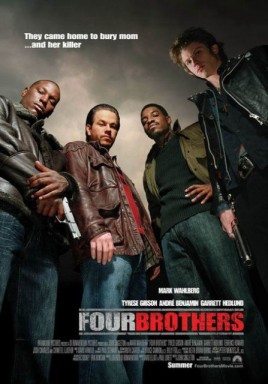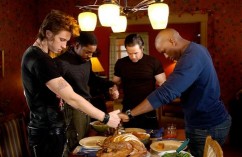|
Four
Brothers
Right about now, John Singleton is sitting pretty. As a
producer, he stands to gain a heap of praise for self-financing
one of the best films of the year thus far, Hustle
and Flow. As a director, his latest effort Four
Brothers is a solid and engrossing revenge flick to
say the least.
The
trailers and the posters both want you to believe that this
film is a straightforward revenge film right off the bat.
It eventually gets there, but it’s the setup to the
revenge arc that really makes things cook in the later acts.
Evelyn
Mercer (Fionnula Flanagan) is a firm believer in the good
that so often lies buried below the surface of many troubled
youth. When we first meet Evelyn, she is scolding a young
thief for his foiled attempt at lifting a tootsie roll from
the local corner market. Her insights are admirable, informing
the youth that he is better than that, and urging the clerk
to coyly feign a phone call to the police. The lesson is
clear, and her approach to the conflict is laced with love
and genuine human spirit.
All
of this is cut down in a hail of gunfire when hoodlums enter
the liquor store, armed to the teeth with pistols and shotguns,
and proceed to kill both the clerk and Evelyn in unnecessary
cold blood. In an interesting use of voice-over given by
police officer Lt. Green (Terrence Howard) as members of
the Mercer family enter Evelyn’s wake, we learn that
she had spent the majority of her life offering rehabilitation
and open arms to those youth which society deemed lost causes.
By opening her doors to foster children Evelyn not only
gave countless lives a second chance, she also assisted
in finding them loving homes to further their development
and growth throughout the years.
 |
As Lt.
Green explains, in all of her years she only came across
four truly lost causes. These four children were supposedly
so far gone that no amount of reaching out could ever fully
pull them back from the void to be placed in a safe and
nurturing environment completely free from chaos. When faced
with these obstacles, Evelyn chose to open her own home
to these children, permanently, by adopting each one, and
essentially saving them from much darker fates.
Bobby
Mercer (Mark Wahlberg) returns home alongside his brother
Jack (Garrett Hedlund). They meet up with their third brother,
the seemingly straight-laced Jeremiah (Andre Benjamin) whose
house and family are the essence of purity. The sibling
missing from the funeral is Angel (Tyrese Gibson), who is
labeled as the pretty boy, but still a grade A F-up just
the same.
One
point of contention with the film is that the brothers'
past sins are mentioned several times throughout the film,
but the degree to which these troubled pasts extended is
shrouded in subtle dismissal. Basically, we are to accept
that these characters dwelled amongst the most dastardly
villains to walk the street, yet the particulars are limited
to asides such as “remember when?” and the like.
It’s a dismissible nitpick in the end, but while establishing
the characters it is a point that calls itself to attention
frequently.
Yet
despite this smattering of vague exposition, the initial
establishment of these characters is what drives the film
in the later acts rife with revenge conventions. In fact,
the subject of seeking revenge comes up in happenstance
and seemingly natural through the course of the brothers
mourning. It is implied repeatedly that Bobby’s only
reason for returning would be to seek vengeance, but this
is never really touted heavily until suspicion begins to
flourish.
The
brothers begin looking into the details surrounding their
adopted matriarch’s death, and it becomes clear that
the further they delve, the more the facts begin to conflict
with one another. As the plot winds down, we are submitted
to a string of red-herrings that hold weight enough to keep
you on your toes.
Singleton
loves to paint in broad grey strokes, weaving a canvas from
his primary contrasting colors of choice, which often seem
to lead back to black and white. His palette is ripe with
the understanding that evil isn’t defined by color,
and that heroes can also find ways to transcend social stereotypes.
Make no mistake, there is a reason behind the pairing of
the brothers along with the clothes they wear, the villains
wear, hell, even the weather plays a factor in his canvas.
Nothing
is ever cut and dry, and Singleton revels in this notion
and the audience gets to reap the benefits with a purely
entertaining film.
Rating:

|








